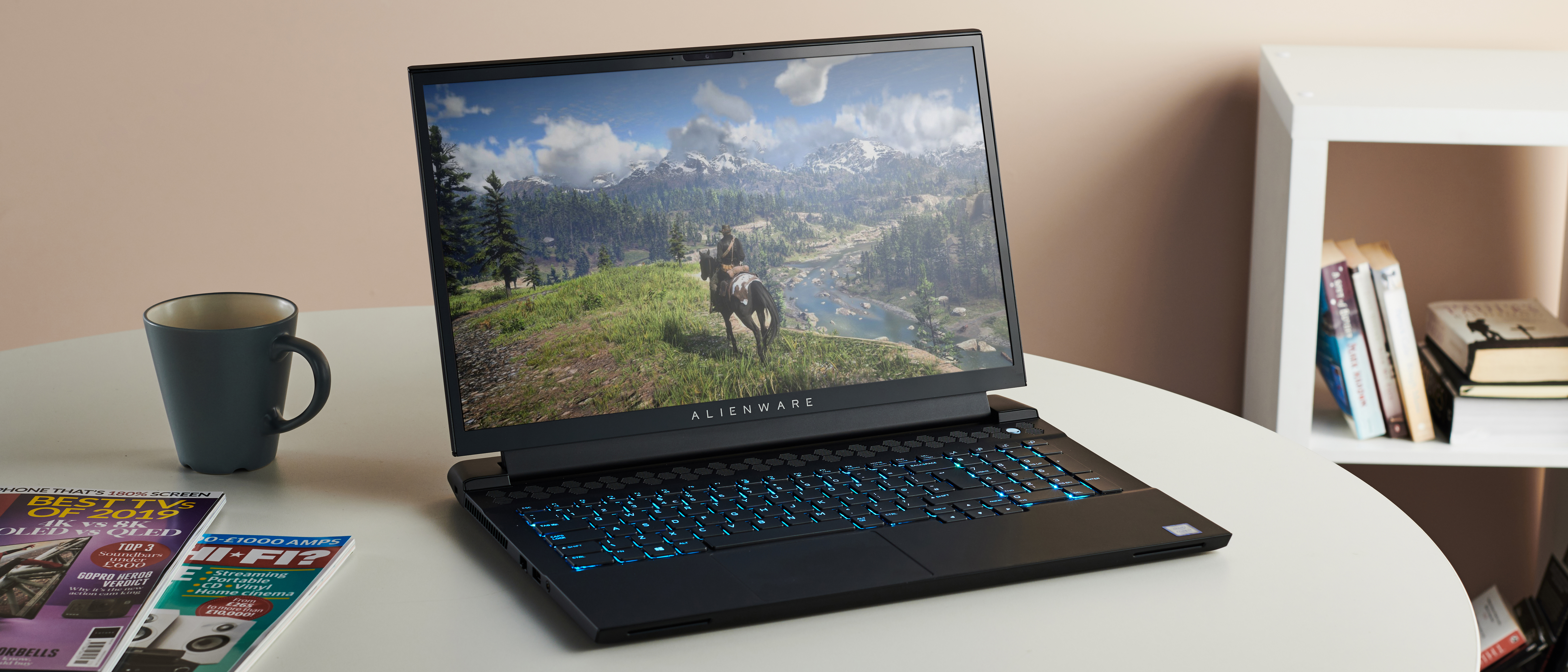TechRadar Verdict
The Alienware m17 (2019) is an incredibly powerful and stylish gaming laptop that does a lot of things right. We love the new design, and Dell has packed it with some of the best mobile gaming components on the market today. However, it's also very expensive, and battery life is particularly poor.
Pros
- +
Stunning design
- +
Thin and light
- +
Powerful
- +
Future-proof
Cons
- -
Expensive
- -
Only 1080p screen
- -
Short battery life
Why you can trust TechRadar
Two-minute review
The Alienware m17 (2019) is a reinvention of sorts for Dell’s flagship gaming brand, and it's one of the best 17-inch laptops ever made. With a bold new design swaggering stark colors, premium materials, and understated-yet-classy lighting, this is one of the best-looking gaming laptops we’ve seen. It’s also among the lightest and thinnest 17-inch gaming laptops in the world at just 18.6mm and 2.63kg, helping dispel the notion that gaming laptops need to be big, bulky, monsters.
It certainly stands out from the crowd – that’s without mentioning its upgraded internals. If its design accolades aren’t enough to impress you, its powerful specs should. Inside that thin packaging, this laptop rocks 9th-generation Intel Core processors, DDR4 RAM and Nvidia’s latest RTX mobile graphics. It comes in a variety of configurations, but even the lowest-specced models will handle the latest games with aplomb.

Sadly, the Alienware m17 (2019) continues its line’s penchant for hefty price tags. This is a gaming laptop that is out of the reach of many people, even in its entry-level configuration. Alienware does justify the high price tag with its combination of premium design, excellent build quality and powerful components. However, for budget and mid-range consumers, it’s still an exorbitant purchase.
The battery life is also a sore spot here. In our tests, it only managed two hours and 43 minutes of moderate use before needing to be plugged in. While no one really expects gaming laptops to have exceptional battery lives, this is particularly short nevertheless, especially considering the price of entry.
Overall, though, Dell has once again produced a stunning gaming laptop, and one that's sure to have many gamers lusting after it. Alienware has a fine pedigree when it comes to gorgeously designed (and pricey) devices, and the Alienware m17 (2019) doesn’t fall far from the tree.

Here are the specs of the Alienware m17 (2019) sent to TechRadar for review:
CPU: 2.4GHz Intel Core i9-9980HK (8-core, 16MB cache, up to 5.0GHz)
Graphics: Nvidia GeForce RTX 2080 (8GB GDDR6)
RAM: 16GB DDR4 (2,66MHz)
Screen: 17.3-inch Full HD (1,920 x 1,080) IPS, 144Hz
Storage: 2 x 512GB RAID 0 SSD (PCIe)
Ports: 3 x USB 3.1 Gen2, 1 x Thunderbolt 3 (USB-C), mini DisplayPort, HDMI-out, Gigabit Ethernet, 1 x Alienware Graphics Amplifier, 1 x Mic-in, 1 x Headphone-out
Connectivity: Killer Networks E2600 Gigabit Ethernet, 802.11ac Wi-Fi ; Bluetooth 5.0
Weight: 5.80 pounds (2.63kg)
Size: 15.17x 0.8 x 12.6 inches (399.8 x 20.5 x 295.5 mm); W x H x D
Price and availability
Alienware has a reputation for releasing very desirable, yet also very expensive devices, and the Alienware m17 is no exception. However, thanks to the sheer power and performance it offers, along with the stylish design, the high price tag doesn’t feel too outrageous.
Starting at $1,349.99 / £1,749 (this configuration isn't available in Australia at the time of writing), you get a 9th-generation Intel Core i5-9300H processor, Nvidia GTX 1660 Ti 6GB, 8GB of RAM, 256GB SSD and a 17.3-inch 1080p screen. That's a relatively restrained asking price for a gaming laptop, especially one from Alienware, but those specs aren’t particularly powerful.
The GTX 1660 Ti, for example, is a decent-enough midrange GPU, and one which will handle most modern games at medium-to-high settings relatively well at 1080p; however, when you’re spending this kind of money on a gaming laptop, you may want a bit more bang for your buck.
The good news is that, like many of Dell’s laptops, the Alienware m17 (2019) is available in a wide number of configurations, either pre-built, or built to spec via Dell’s website. This enables you to choose a model of the Alienware m17 that’s suited to your needs and budget.
The fully specced-out model of the Alienware m17 (2019) comes with a 9th-generation Intel Core i9-9980HK, Nvidia RTX 2080 Max-Q design, 16GB RAM and 1TB SSD made up of two 512GB PCie M.2 SSDs in RAID 0 configuration.
This model comes with an eye-watering price, however, at $4,229.99 (£3,329, AU$5,299). Even by gaming laptop standards, this is a very high asking price that will be out of the reach of most people.
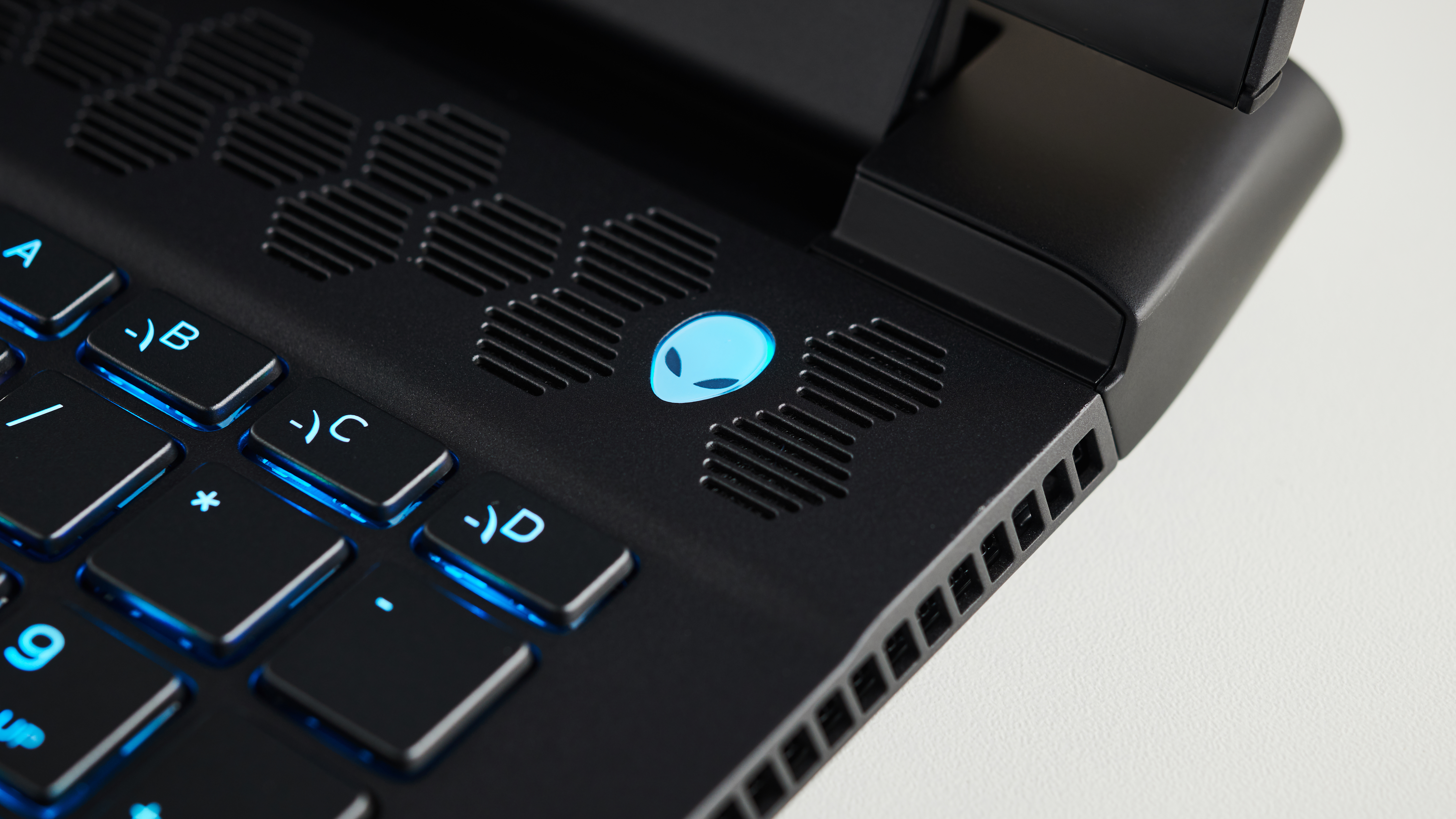
The model we reviewed comes with an Intel Core i7-9750H processor, 16GB RAM, RTX 2080 GPU and 1TB SSD, and retails at a more manageable (yet still very expensive) $3,099.99. In the UK, this model comes with 256GB SSD for £2,599, and in Australia it comes with a 512GB SSD for AU$4,698.99.
While it seems like the UK gets a raw deal when it comes to storage, remember that you can configure the m17 to have more storage if you need it, which you probably will – with an increasing number of modern games asking for 100GB of storage space, 256GB is just too low these days.
So, with the Alienware m17 (2019), Dell has once again produced a very expensive gaming laptop, and the m17 will have to perform well in order to justify that price tag, and prove that it's one of the best 17-inch laptops in the world.
Design
While Alienware is known for making pricey products, it's also got a fantastic track record when it comes it comes to making beautifully-designed devices, and the Alienware m17 (2019) may just be the best-looking laptop the company has ever made – and considering Alienware’s reputation, that’s high praise indeed.
The new m17 has had an overhaul when it comes to the design, and not only does it look different (we’ll get to that in a bit), but it’s also lighter and thinner than the previous m17, at just 2.63kg and 18.6mm.
It’s almost as thin as the Asus ROG Zephyrus S GX701, and a bit lighter. The Zephyrus used to be our favorite example of a gaming laptop that can be powerful, as well as thin and light – now, the new Alienware m17 is giving it a serious run for its money.
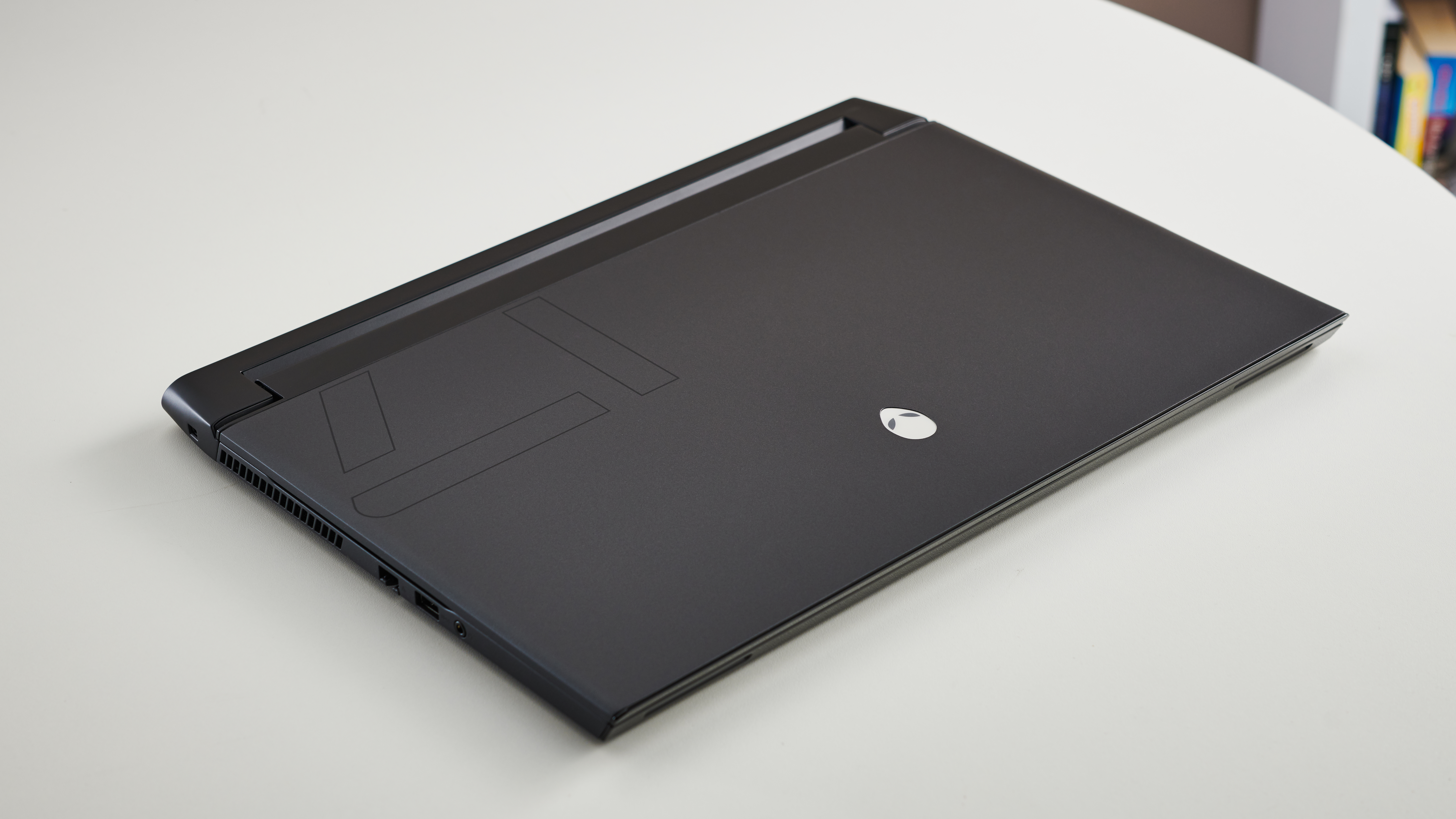
The Alienware m17 comes in two color themes: Lunar Light, which is a bright white, and Dark Side of the Moon, a moody black and gray combo, shown here. When closed, it’s an eye-catching sight, with a glowing Alienware logo on the back, along with a subtle ‘17’. The new, smaller, Alienware m15 gets a similar but shrunk-down, treatment with a ‘15’ on the back.
While the design of the Alienware m17 is subtle compared to some of its competitors, it’s still unmistakably a gaming laptop. This is a machine that’s not ashamed of its roots, and which is aimed at more mature gamers, many of whom have probably grown up with Alienware – if not having bought the products, certainly aware of their reputation and aspiring to one day own one. It’s certainly a market that will be more open to the idea of paying the kind of money Dell is asking for the Alienware m17.
The body of the laptop is made of a magnesium alloy that feels at once light yet sturdy, which adds to the premium look and feel. At the rear of the m17 (underneath the screen, when it's opened), are the connection ports, along with large exhaust ports that pump out the hot air that the powerful components inside generate.
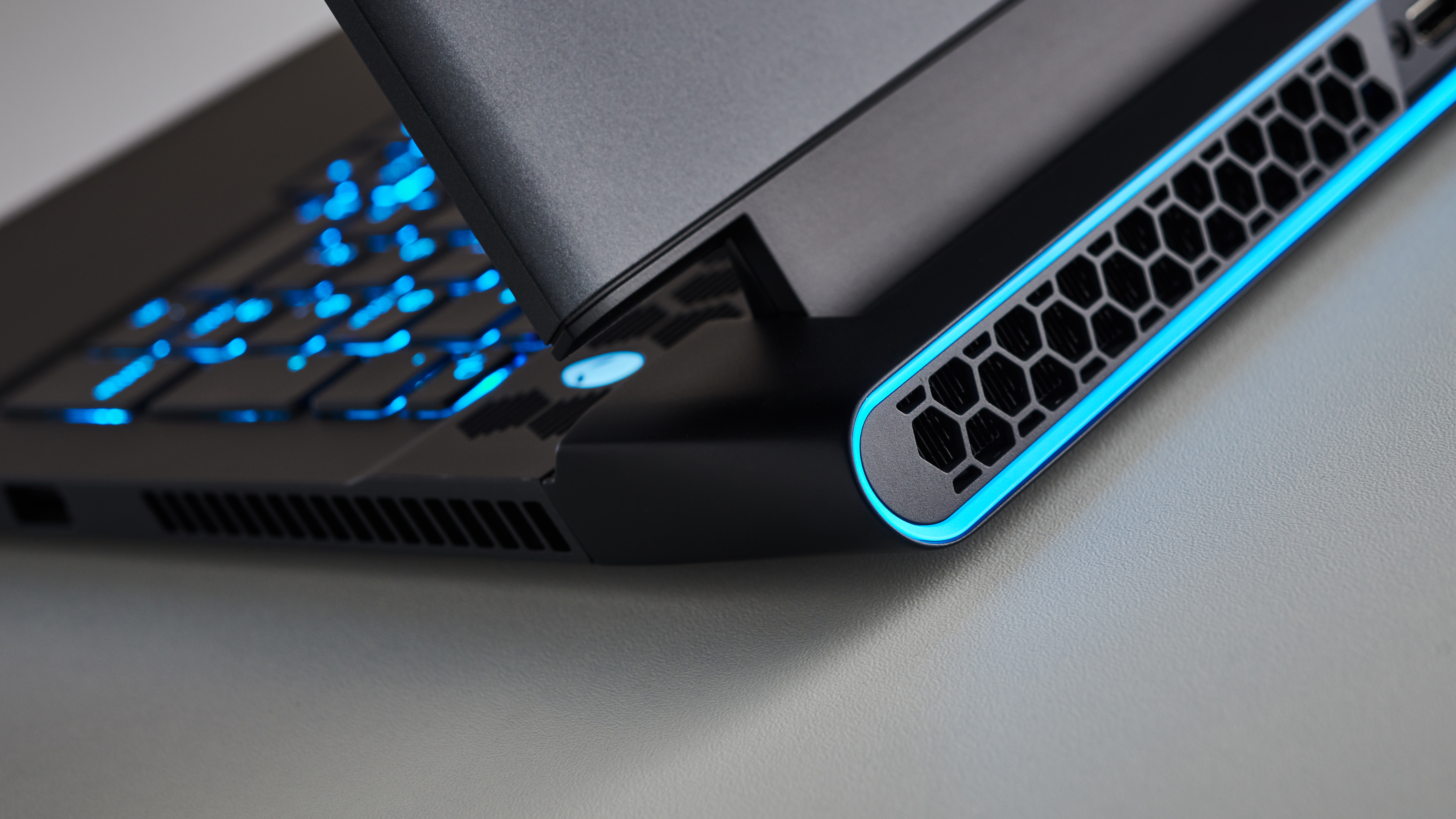
Dell has done a good job of incorporating the exhausts into the overall design of the Alienware m17, giving the laptop an industrial look, and showing that such a relatively functional and unglamorous feature can positively add to the aesthetics of a device.
When you open up the m17, the overall design continues to impress, with the keyboard, trackpad and wrist rests all maintaining the premium look – it really is one of the nicest-looking gaming laptops we’ve seen.
The keyboard is in a recess in the body, which actually makes for a slightly more comfortable tying experience, as it means your palms and wrists are above the keys. The keys are big and easy to hit, with decent enough travel, while LED lighting around each key is again subtle but stylish.

As we’ve come to expect from gaming laptops, the Alienware m17 offers a good selection of ports, with two USB 3.1 ports on the right-hand side. On the left is another USB 3.1 port, along with an audio jack and Ethernet port.
That last port is a welcome addition, as many laptops don’t include it. While Wi-Fi speeds are generally fine these days, it’s nice to have the option to switch to a wired network connection if you desire.
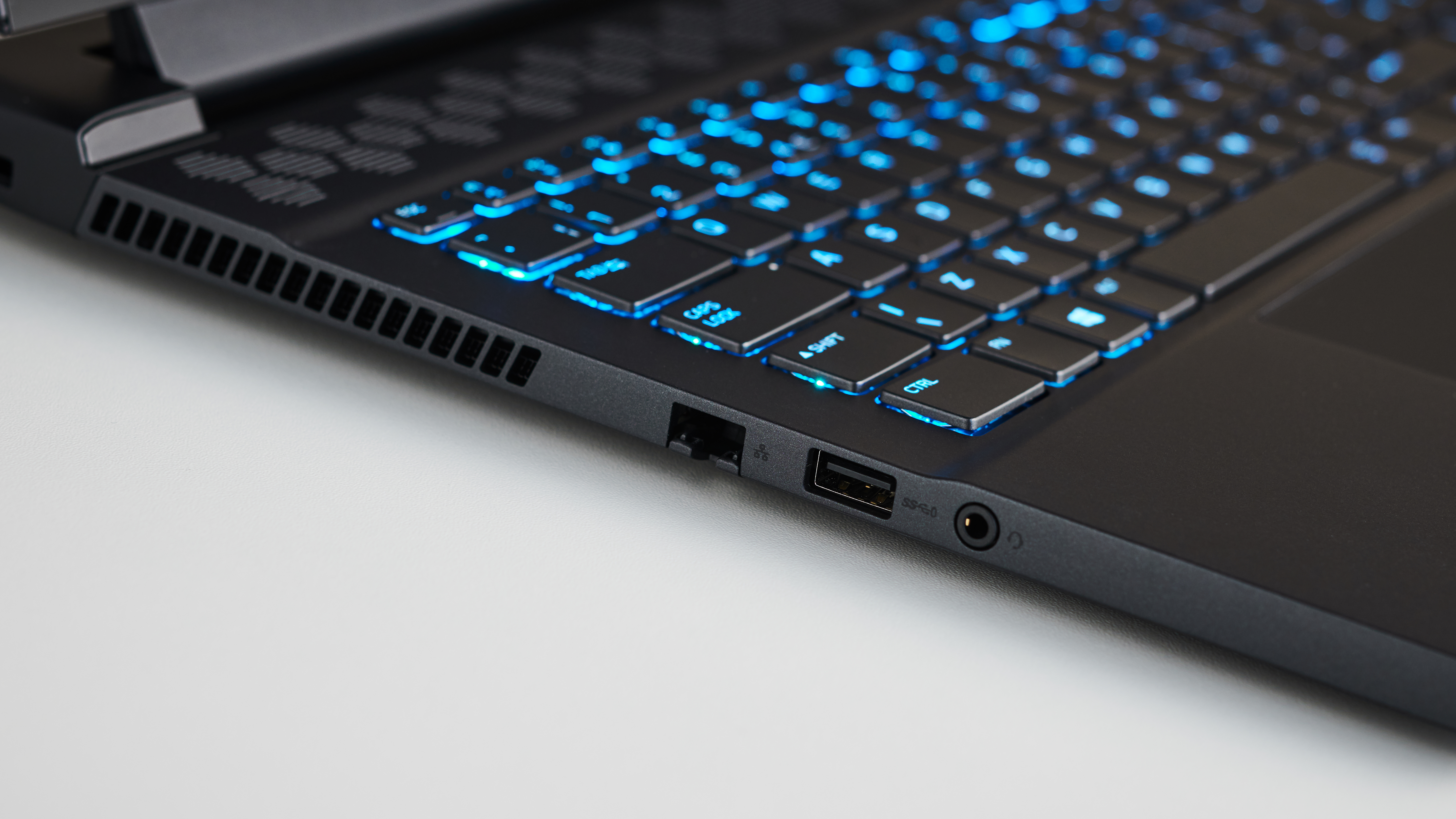
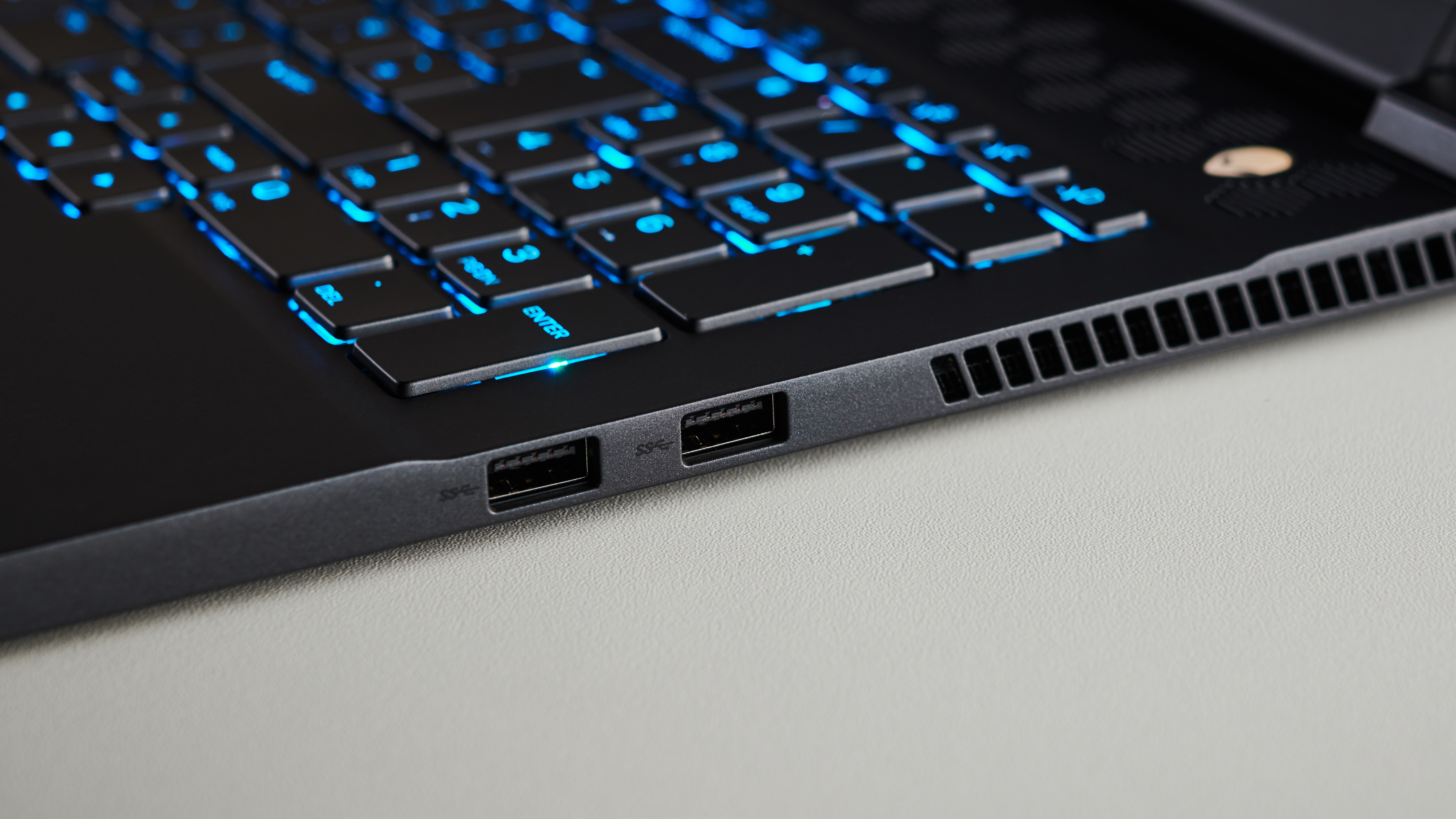
On the back of the laptop, between the exhaust ports, are a Thunderbolt 3 USB-C port, HDMI 2.0, mini DisplayPort 1.4, a power jack and an unusual-looking proprietary port for the Alienware Graphics Amplifier.
The Graphics Amplifier is an external box in which you can install a regular desktop GPU and connect it to the Alienware m17 for extra graphical grunt. If you get the model with the RTX 2080 then you’re unlikely to need that extra grunt at the moment, but it means that in a few years you could add in new GPU to prolong the life of your Alienware m17. It also means that you can save a bit of money by getting a version of the m17 with a less powerful GPU, then add a more powerful one later.
Of course, with an external GPU plugged in the Alienware m17 becomes even less portable. Also, Dell isn't the only company to provide external GPU solutions for its laptops – for example, Razer has the Core v2. However, most of the others use Thunderbolt 3 connections, making them a lot more versatile; the proprietary nature of the Graphics Amplifier port means you can only use it with Alienware products, and it’s a move that feels rather regressive these days.
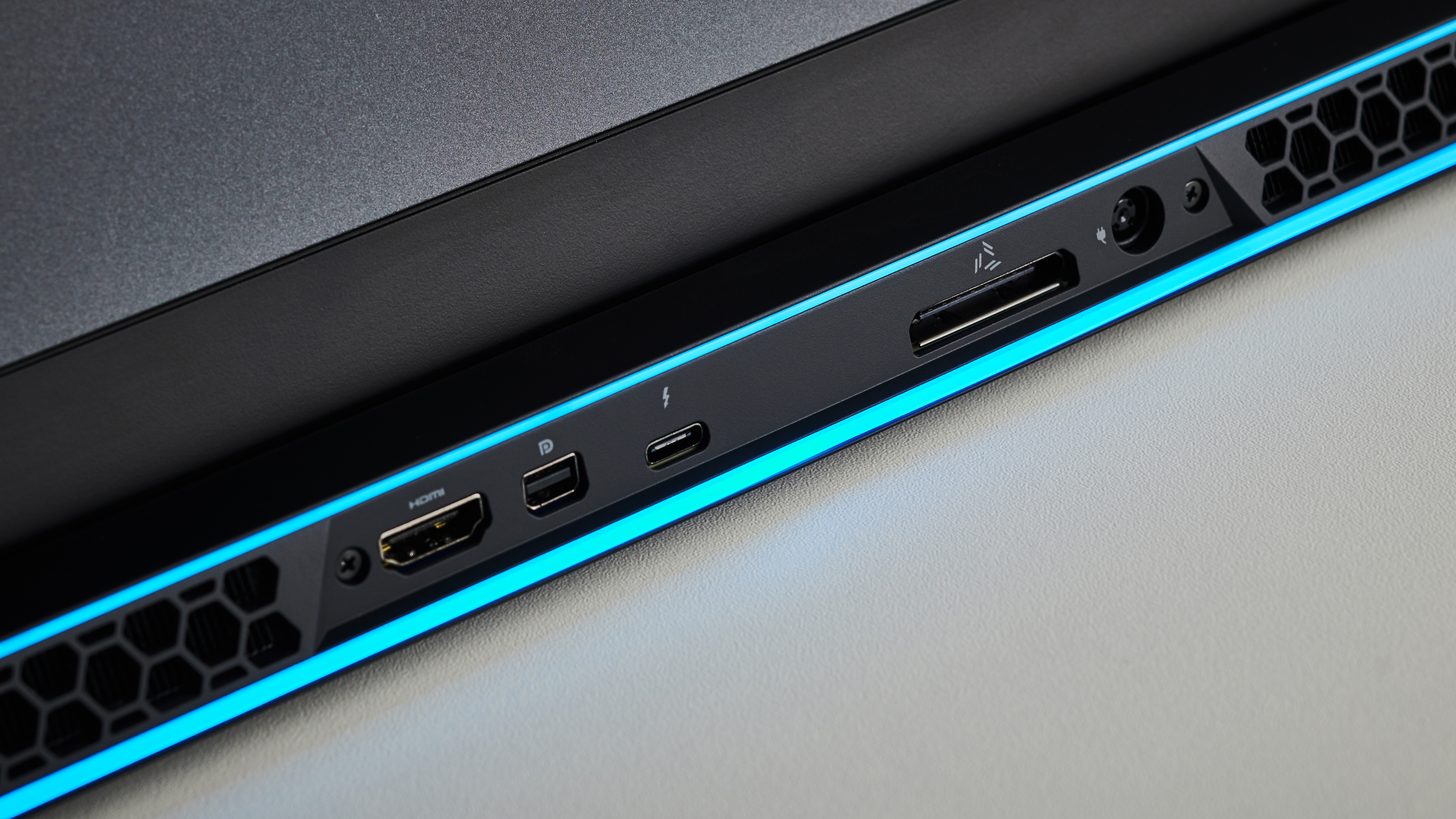
Here's how the Alienware m17 (2019) fared in our suite of benchmark tests:
3DMark Sky Diver: 40,522; Fire Strike: 18,178; Time Spy: 8,071
Cinebench CPU: 1,186 cb; Graphics: 122.42fps
Geekbench 4 Single-Core: 5,222; Multi-Core: 22,947
Geekbench 5 Single-Core: 1,140; Multi-Core: 5,620
PCMark 8 Home: 3,944
PCMark 8 Battery Life: 2 hours 43 minutes
Battery Life (TechRadar movie test): 5 hours 20 minutes
Total War: Warhammer 2: 172fps (1080p, Low) 80fps (1080p Ultra)
Shadow of the Tomb Raider: 112fps (1080p, Low), 92fps (1080p, Ultra)
Performance
While the aesthetics is likely one of the attractions of an Alienware gaming laptop, the big draw is the expectation that it should perform very well when running the latest games.
The good news, at least with the model we reviewed, is that Alienware m17 (2019) performs very well. With graphical settings set to ultra, the m17 managed 92 frames per second running Shadow of the Tomb Raider – and it's a fairly graphically-intensive game, so to hit 92fps is very impressive. Consoles like the PS4 Pro and Xbox One X struggle to meet 60fps.
However, it’s worth pointing out that the Alienware m17’s screen is just 1080p, which is a rather conservative resolution these days when it comes to PC gaming – and the PS4 Pro and Xbox One X are running at higher resolutions as well.
This means that if you go for the model with the RTX 2080, you’re actually not getting the most out of the GPU unless you hook it up to an external display. If you have the budget you may want to go for the fully-specced version so that you can play the latest games with all the graphical bells and whistles turned on, and that would mean you shouldn’t have to worry about upgrading your laptop for a good while.
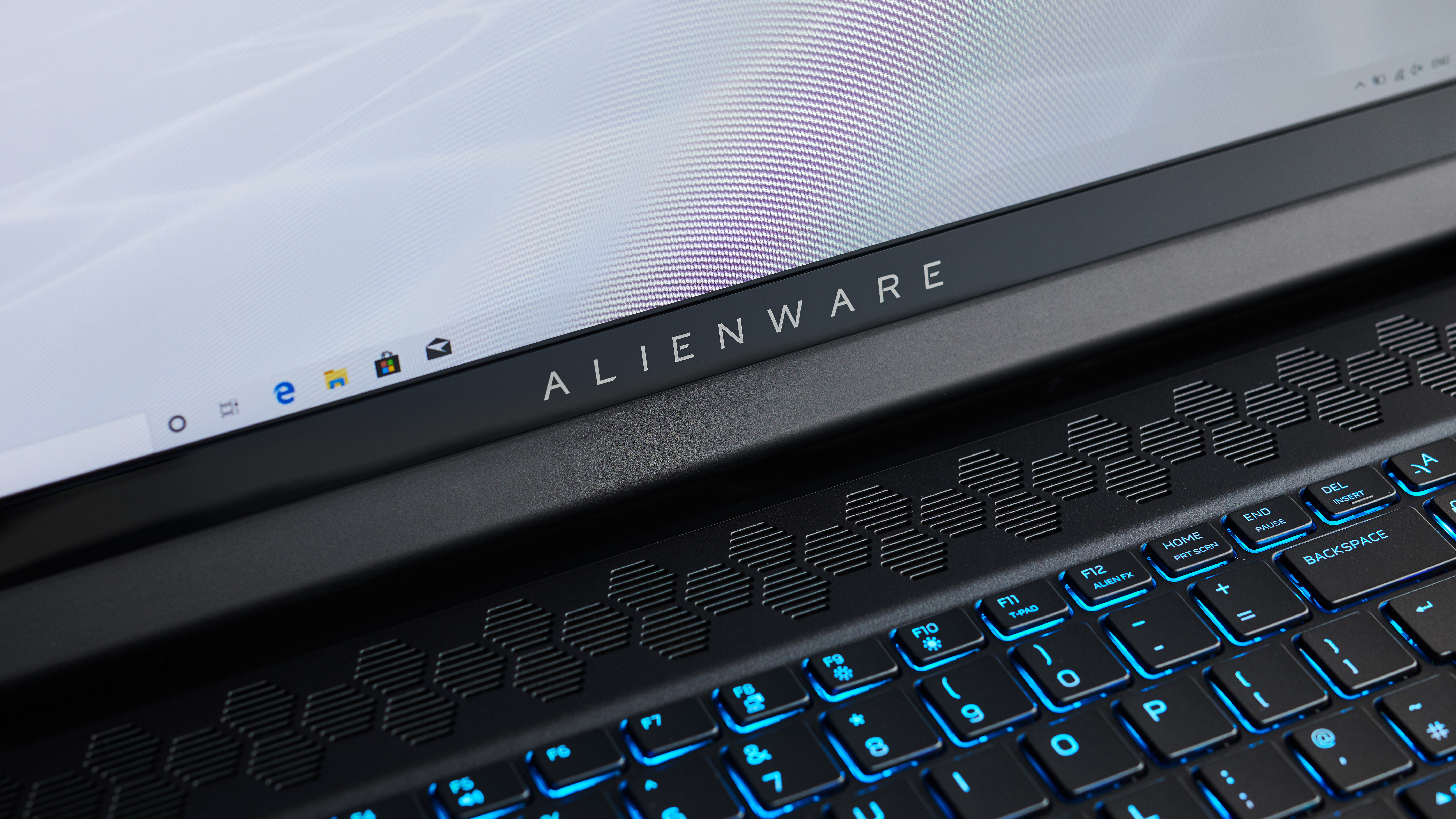
Having an RTX model inside means you get support for ray tracing, which is an advanced lighting effect in games that offers more realistic graphics. Again, it means this is a gaming laptop that will keep pace with the latest games for years to come, even when the PS5 and Xbox Scarlett next-gen consoles come out.
The 1080p screen also means you can get a model of the m17 with a less powerful (and expensive) GPU, and it will still perform brilliantly at high graphical settings, which is worth considering if you want to save a bit of money.
We played a number of games on the Alienware m17, including Red Dead Redemption 2, and the laptop handled all of them brilliantly. Considering the spec, this isn’t too surprising, but if you want a (reasonably) portable powerhouse to play games on, this is a good choice if you have the money.
Away from gaming, the Alienware m17 handles Windows 10 like a champ. With the powerful components inside it could easily double up as a mobile workstation, if you need a laptop for intensive tasks such as 3D design or video editing and rendering.
Overall, the performance of the Alienware m17 with the latest games is impressive, and goes some way to justifying its high price.
Battery life
Large 17-inch gaming laptops packed full of high-performance components are historically known for being real battery guzzlers, and the Alienware m17 (2019) is no different. However, even by gaming laptops standards, the m17’s battery life is shockingly short.
In our general battery benchmark, which runs a looped 1080p video at 50% brightness, the Alienware m17 (2019) lasted just five hours and 20 minutes, and that was when performing the relatively low-intensity task of playing a video. However, in the PC Mark 8 battery test, which replicated more intensive day-to-day tasks, such as document creation and video calling, the battery life drained in just two hours and 43 minutes.
That’s ridiculously short, and basically it means that if you want to use this laptop for anything even remotely taxing, you’ll need to plug it in – which rather defeats the object of having a laptop.
As for gaming, you can forget about playing anything without having your m17 plugged in. For most gamers this won't be an issue, but the incredibly short battery life is still a bit of a disappointment, especially when everything else about the Alienware m17 (2019) is so good.
Buy it if…
You want a future-proof gaming laptop
Depending on the spec you get, the Alienware m17 (2019) has components powerful enough to see you playing the latest games with ease for years to come, particularly if you go for the option with the brilliant RTX 2080 GPU inside. For added future-proofing, you can also hook up an external GPU if you find the m17 struggling in the future.
You want a gaming laptop that makes a statement
Alienware is a premium brand, so owning any of its products makes a statement as soon as people clock that iconic logo. The fact that the m17 is also so stylishly designed means it's certain to turn heads wherever you go.
You believe gaming laptops don’t have to be big and bulky
The Alienware m17 (2019) is one of the thinnest and lightest 17-inch gaming laptops we’ve ever used; you can carry it around with you comfortably, and it makes bulky gaming laptops instantly look, and feel, dated by comparison.
Don’t buy it if…
You’re on a budget
The Alienware m17 (2019) is a fine gaming laptop, but it’s also a very expensive one. While much of the price is justified, you're also paying a premium for the design and branding, and if you’re on a budget there are other options out there which offer better value.
You want to use it on the move
Even by gaming laptop standards, the battery life of the Alienware m17 (2019) is frustratingly short, which means you’ll need to be close to a power socket any time you want to use this laptop for anything more intensive than firing off a few emails.
You’re a casual gamer
The Alienware m17 is a serious bit of kit, but if you’re a casual gamer who only plays a few indie or retro titles occasionally, then this is not the laptop for you. There are budget gaming laptops that can handle these games just fine, and for a lot less money – and thanks to integrated graphics becoming ever more powerful, you don’t even need to buy a dedicated gaming laptop to play games that aren’t too graphically intensive.
- Check out the best gaming laptops

Matt is TechRadar's Managing Editor for Core Tech, looking after computing and mobile technology. Having written for a number of publications such as PC Plus, PC Format, T3 and Linux Format, there's no aspect of technology that Matt isn't passionate about, especially computing and PC gaming. He’s personally reviewed and used most of the laptops in our best laptops guide - and since joining TechRadar in 2014, he's reviewed over 250 laptops and computing accessories personally.
